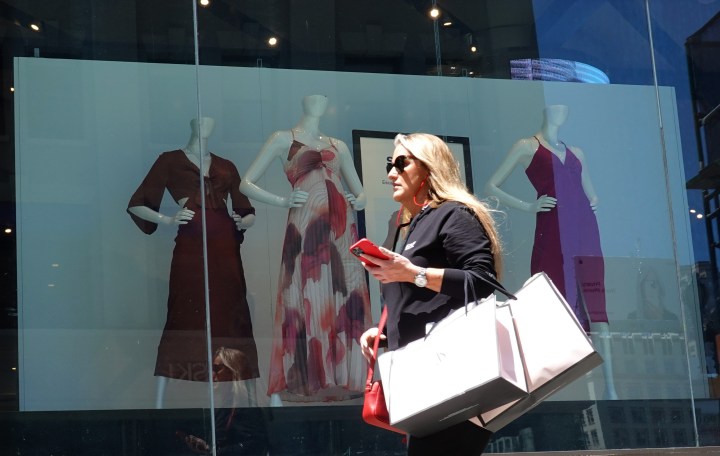
Is a growing middle class the real key to economic growth?

This is just one of the stories from our “I’ve Always Wondered” series, where we tackle all of your questions about the world of business, no matter how big or small. Ever wondered if recycling is worth it? Or how store brands stack up against name brands? Check out more from the series here.
Listener and reader John Ledbetter from Knoxville, Tennessee, asks:
Why does it have to be population growth causing so much of economic growth (as the “baby shortage!” people would have it)? Why can’t it be poor people gaining wealth in a tight labor market (or “labor shortage!” as employers would have it) and then spending more? Thanks!
First, let’s talk about what economic growth is: an increase in the goods and services produced in a country. Gross domestic product is the measure of the value of those goods and services. GDP is typically used to assess how fast an economy is growing.
Economic growth is important because it means a higher standard of living.
How does an economy grow?
Many economists agree that population growth is important for economic growth. But, of course, it’s more complicated than that.
An economy can theoretically grow while having a stable population by investing in “productive equipment, productive people and productive ideas,” Lawrence White, a professor of economics at the New York University Stern School of Business, told Marketplace. Economist Charles Engel told Marketplace that “capital and investment are the main ingredients in economic growth.”
But Simeon Alder, a visiting assistant professor of economics at the University of Wisconsin-Madison, said he thinks new ideas “are the fundamental engine of growth.”
“To get these extra ideas, you just need more and more people as sort of a general result,” he explained.
Other experts, like public policy professor Maurice D. Kugler of George Mason University, say that technological change is more important for economic growth than population growth, but the latter can be part of the equation.
“If population growth is associated with an increase in consumer demand, that can provide more incentives for [research and development] and new goods and new technologies to be introduced,” Kugler said.
Some economists have expressed concerns about what negative population growth could mean for economic growth. America’s Social Security system is dependent on the current working population making payments into it. So if there are fewer people working in the future, that raises questions about the program’s sustainability.
These are some of the reasons the conversation surrounding economic growth is tied to having a big, growing population. Mira Farka, an associate professor of economics at California State University, Fullerton, told Marketplace she doesn’t think we’re at the point where we can grow the economy while stifling population growth.
The middle class
Now to the possible alternatives to population growth as an economic engine: Experts like Kugler agree with our listener John Ledbetter that lower-income people gaining wealth and entering the middle class can help bolster economic growth.
“When you have wealth concentration, so that the rich have a large amount of the wealth, then you have less potential consumers, and you’ll have less incentives for technological innovation for the introduction of new goods,” Kugler said.
Kugler said that a growing economic middle class helped drive economic growth in the U.S. during the 20th century.
From 1947 to 1979, the middle class received 54% of the country’s total income on average, according to the Center for American Progress. During that period, the economy grew at a steady rate of 3.7% a year. But from 1980 to 2010, when the middle class “was weakening” and received 46% of the nation’s total income on average, the economy grew at a rate of 2.7%.
How economic growth can hurt
Some experts have raised concerns about our preoccupation with economic growth, like Madhavi Venkatesan, an associate teaching professor of economics at Northeastern University.
Some people “truly believe that their purpose is to consume, the focus should be to get as much income as possible [and] firms should be maximizing profits,” Venkatesan said. “But the part of well-being is not in the quantitative values, but in the qualitative values.”
Kugler said we shouldn’t try to halt economic growth, but focus on the right kind of economic growth.
“The wrong kind of economic growth can have adverse effects on society,” Kugler said. “So for example, growth that is based on technologies that destroy the environment is detrimental in the long run and is unsustainable.”
That’s why Kugler thinks, for example, renewable energy sources could be a driver of economic growth.
“We should have in place the right regulations and controls so that economic growth is directed towards green technologies, rather than fossil fuel-based energy sources,” he noted.
There’s a lot happening in the world. Through it all, Marketplace is here for you.
You rely on Marketplace to break down the world’s events and tell you how it affects you in a fact-based, approachable way. We rely on your financial support to keep making that possible.
Your donation today powers the independent journalism that you rely on. For just $5/month, you can help sustain Marketplace so we can keep reporting on the things that matter to you.











